Imagine a supervisor who continually refuses to give your vacation time in favor of their workplace cliques. So you end up having zero time off in two years. While ‘I can’t even’ just by typing this, for one Redditor who worked in a disability shared accommodation agency this was a reality.
As if his job wasn’t hard enough already, “one of the Clique members ‘Karen’ was appointed acting supervisor and it went to hell,” the former employee wrote in a post on r/ProRevenge. Turns out, Karen wasted no time in giving her friends the best shifts and making their requests a priority. So every time the author would apply for leave, Karen would reject it “on the grounds that others had already submitted leave.”
Understandably, the author’s frustration grew: “This annoyed me as I have a family that I wanted to take on holiday.” But this all came to an end when the CEO himself intervened, asking his employee to take some time off. Read on for how this whole situation evolved and let me tell you, there’s some sweet revenge in the end.
A former employee has shared how his Karen supervisor would refuse his leave requests in favor of her clique workers so he had no time off for two years

Image credits: Universal Eye (not the actual photo)
“A workplace clique is when a group of coworkers become tightly knit, to the extent they exclude or otherwise negatively impact on coworkers who are not in the clique,” Christine Mitterbauer, licensed and ICF approved career coach and serial entrepreneur told Bored Panda in an interview. “If you’re experiencing this as a coworker not in the clique, it can be very stressful and damaging to your experience at work, not to mention your confidence and your career progression.”
One shift, the CEO told the author he should take his earned leave time
Image credits: Scott Graham (not the actual photo)
As soon as you feel that coworkers are becoming too close and cliquey, Christine recommends preparing yourself for a bit of a counter attack. “Every situation is different, but one thing to look out for is starting to gather proof that you’re not being treated fairly. Whenever you have conversations with the people involved, try to do them in writing so there’s a visual record of what they said. Taking pictures of certain situations, especially if the picture can demonstrate what time something occurred/did not occur, this can also strengthen your case.”
Fast forward to the author’s vacation, and he gets a call from a very confused supervisor Karen
Christine continued: “Also, get other people in the company on your side, including other coworkers who are not in the clique, as well as superiors, bosses or other allies you can think of. Be fair and honest when you involve them in conversations. This isn’t about you forming your own clique and playing the same dirty game as the clique is playing with you, but it’s about gathering proof and allies that you can eventually use to get the people in the clique to be reprimanded and ultimately stopped.”
But when the CEO called a meeting with the author and Karen, her deeds became clear
Image credits: Mike Haw (not the actual photo)
The career coach concluded that in case you’re in a similar situation, it’s best to “always act quickly when you suspect people are acting fishy, as it can really ruin your confidence and experience at work if this kind of behavior goes on for too long.”
After the author came back to work, he found out that Karen lost her promotion
And the CEO made some solid changes in the workplace
This is what people had to comment about this whole situation
Great! This is what a CEO should do. Protect the people working for you and not take bs from the a$$holes. Also I love it that the CEO puts in hours on the "workfloor" helping out the employees. The final sacking of that nasty woman and splitting up her "friends" is a very wise move.
That's a great character in these guys. I worked managing a house like this and I was the first one to stay if problems arose. I never took my vacation first. You have to try to keep your staff in a good place with each other and animosity is not the way. During a approaching snow storm, myself and one other staff member, preemptively packed for the week and did 12 hour shifts where others couldn't make it in. We were there 5 days but it was a bad storm and was necessary. It wasn't what I absolutely wanted to be doing but I knew it would cause problems for other people to try to get to work. I had a couple staff give me time back and allowed me to be home a couple extra days.
Load More Replies...As an ex-nurse, I can add more context here. Almost all professional work in health industry experience constant work-drama. It is due to the hierarchy where some people is always get more consideration due to their position. For example any GP is always win when having problem with nurse.. Every specialist is always in higher position from GP.. So everybody is always should relented when they in a way with anyone with higher position in hierarchy. I am having a reality shock when start work in IT. In IT we always have a say, even if the problem involve the top management.
I cannot stand the fact that doctors look down on nurses, especially since the latter do the lion's share of the work in every hospital.
Load More Replies...To the person that said they should all be fired, the problem there is that the rest of the staff get to strap on roller skates and cover the shifts. State and Federal laws require a certain amount of coverage and you can't just hire anyone off the street to cover them. Replacements need to be certified and have to go through weeks of training to become certified. It would not have been the smartest move to let them all go. As they say, cut the head off the snake and the body will die...because the Karen got fired and the rest separated, it probably solved the issue.
I used to have a CEO like that. Didn't even have an office, even though he could have. Sat in a cube like everyone else.
There's a tendancy for women bullies to go into careers 'caring' for others because it gives them power over vulnerable people. Nursing, teaching, care work... vet VERY carefully.
Please stop with this sexist Karen trope all the time. I like a good employee gets revenge on a bad boss story as much as anyone but referring to her as a Karen wasn’t necessary. Bad bosses come in both sexes (and even non binary) - my worst boss was a man. The Karen trope originally started as a way to call out a certain type of entitled racism from women but now it has evolved into a sexist name for women who do something that someone, often a man, doesn’t like. It’s also extended to any woman who stands up for herself or refuses to serve others, which is why it is so insidious. Please, Bored Panda, start treating women as flawed people, just like you do men in stories where a man is at fault, instead of using the term “Karen” as a stick to beat women with.
Yes it has taken on a whole new meaning. God forbid a woman have a legit reason to complain about something that happened that shouldn't have now any woman that asks a question is labeled a Karen by misogynistic men and women. Plus it seems any woman over the age of 40 is automatically a Karen now too. Racist women were the Becky's and Karen's I guess we should've known it would be used against us all sooner or later. No doubt some weirdo will be calling us Karen's for pointing this out on here
Load More Replies...Why they did nothing to show a reason for promotion. Promotion should be based on merit and not desk jockeying. Infact they seemed only to luck out that the CEO actually cares and noticed this after the scummy one had submitted a write up which crossed his desk.
Load More Replies...At my job I worked in a dept for years and had the second-highest seniority in the off. The company gave first vacation time based on highest seniority. So my co-worker always got all the holiday vacations regardless of who asked first. It was totally unfair. Finally I got promoted to outside sales and had the highest seniority. Still, I didn't hog all the good days because the seniority vacation choosing was a bad rule. I'd alternate Christmas, Thanksgiving and New Year week. I left the school holiday weeks open for those with kids. But I didn't have to. It's only fair.
CEO should initiate a computerized leave request system that bypasses the need for supervisor approval. Then when a leave is put im the system, an automated email goes out to the all involved saying basically, "If there is a problem here, bring it to the regional supervisor's attention" with any changes also generating an email to all involved so the worker can go further up the hierarchy if they want to.
i worked in a place where there was a clique among 7 people. They would all take up the lunch times so they could all lick each others clit. the same group would always get more time off the phones than on. to top it off the manager didnt care because they were all buddy buddy. pissed me off to no end. i left that toxic workplace and now have a great job
(Continued)except she did the last thing backwards, which would totally ruin production for the next day) I told her about it, & volunteered to fix it. She just got into bitchy mood, and said she did it right, and don't. question her again. The next day it DID screw up production terribly. The guy that does that job came in yelling at me that it was ALL screwed up, and who was the idiot that messed it up (looking at me) I said she had done it, and that I had brought it to her attention that it was wrong, but she insisted it was right, and that I screwed it up. Omg, I was SO pissed!!! Anyway, the next day I was fired. As she was walking me out, I asked her why she lied about the stuff she did...she just said she needed an excuse to fire me. The next day I went in to HR, and explained what happened. The next day SHE was fired, and offered my old job back. I just said I appreciated it, but that I decided to retire instead, and collect Social Security, and pay me unemployment.
I had a job that I thought I was going to like, but my "boss" never really appointed anyone to train me, so I figured stuff out myself. She and I butted heads a few times over minor things. One time she told me not to come to work on a certain day (we had very loose scheduling), I thought it was really odd, and I asked her why..she just said we were't that busy, and because she said so, really snotty, and said don't question my orders. Okay, so I took the day off, and when I came back, she ripped into me for "no call-no show" (I have never done that in all my years of working) I reminded her that she TOLD me not to come in, and she denied telling me that. I was going to repeat what she said that other day, and she looked at me with her evil eye, and I shut up. She just said to never question her orders....a week later, she decided to train me how to do a certain procedure, which I knew perfectly how to do it, it was a daily procedure. She was telling me what I already knew, (next page
I worked in an office of about 25 people. The Office Manager was my best friend, actually almost my mother-in-law. She was harder on me than anyone else, not for appearances since not a lot of people knew about our relationship, but because she knew I would take it for what it was. I'd never imagine making others wishes a priority over other workers. Awful management. Good on the CEO for not turning a blind eye.
My mum was a social worker and was overworked and underpaid because people who weren't sick were just calling in sick because they didn't want to deal we it. Once she had to work 48hr shift and after just 20 minutes from picking me up they called her and told her she needed to come back in for another 48hr. She was a single mother and the manager of that house and did more work then the one's actually supposed to do that and had partners at home for kids if they had any and noone above her would ever help. Sorry it's long but the CEO is amazing and deserves the best for actually helping and not just telling them to figure it out. Also they are already short-staffed so firing was going to cause more problems then just splitting them up
At this point, refreshing from the tik tok but same diff
Load More Replies...This doesn't sound like the writer was from the US. He said fortnight, that's not in our vocabulary.
Load More Replies...Great! This is what a CEO should do. Protect the people working for you and not take bs from the a$$holes. Also I love it that the CEO puts in hours on the "workfloor" helping out the employees. The final sacking of that nasty woman and splitting up her "friends" is a very wise move.
That's a great character in these guys. I worked managing a house like this and I was the first one to stay if problems arose. I never took my vacation first. You have to try to keep your staff in a good place with each other and animosity is not the way. During a approaching snow storm, myself and one other staff member, preemptively packed for the week and did 12 hour shifts where others couldn't make it in. We were there 5 days but it was a bad storm and was necessary. It wasn't what I absolutely wanted to be doing but I knew it would cause problems for other people to try to get to work. I had a couple staff give me time back and allowed me to be home a couple extra days.
Load More Replies...As an ex-nurse, I can add more context here. Almost all professional work in health industry experience constant work-drama. It is due to the hierarchy where some people is always get more consideration due to their position. For example any GP is always win when having problem with nurse.. Every specialist is always in higher position from GP.. So everybody is always should relented when they in a way with anyone with higher position in hierarchy. I am having a reality shock when start work in IT. In IT we always have a say, even if the problem involve the top management.
I cannot stand the fact that doctors look down on nurses, especially since the latter do the lion's share of the work in every hospital.
Load More Replies...To the person that said they should all be fired, the problem there is that the rest of the staff get to strap on roller skates and cover the shifts. State and Federal laws require a certain amount of coverage and you can't just hire anyone off the street to cover them. Replacements need to be certified and have to go through weeks of training to become certified. It would not have been the smartest move to let them all go. As they say, cut the head off the snake and the body will die...because the Karen got fired and the rest separated, it probably solved the issue.
I used to have a CEO like that. Didn't even have an office, even though he could have. Sat in a cube like everyone else.
There's a tendancy for women bullies to go into careers 'caring' for others because it gives them power over vulnerable people. Nursing, teaching, care work... vet VERY carefully.
Please stop with this sexist Karen trope all the time. I like a good employee gets revenge on a bad boss story as much as anyone but referring to her as a Karen wasn’t necessary. Bad bosses come in both sexes (and even non binary) - my worst boss was a man. The Karen trope originally started as a way to call out a certain type of entitled racism from women but now it has evolved into a sexist name for women who do something that someone, often a man, doesn’t like. It’s also extended to any woman who stands up for herself or refuses to serve others, which is why it is so insidious. Please, Bored Panda, start treating women as flawed people, just like you do men in stories where a man is at fault, instead of using the term “Karen” as a stick to beat women with.
Yes it has taken on a whole new meaning. God forbid a woman have a legit reason to complain about something that happened that shouldn't have now any woman that asks a question is labeled a Karen by misogynistic men and women. Plus it seems any woman over the age of 40 is automatically a Karen now too. Racist women were the Becky's and Karen's I guess we should've known it would be used against us all sooner or later. No doubt some weirdo will be calling us Karen's for pointing this out on here
Load More Replies...Why they did nothing to show a reason for promotion. Promotion should be based on merit and not desk jockeying. Infact they seemed only to luck out that the CEO actually cares and noticed this after the scummy one had submitted a write up which crossed his desk.
Load More Replies...At my job I worked in a dept for years and had the second-highest seniority in the off. The company gave first vacation time based on highest seniority. So my co-worker always got all the holiday vacations regardless of who asked first. It was totally unfair. Finally I got promoted to outside sales and had the highest seniority. Still, I didn't hog all the good days because the seniority vacation choosing was a bad rule. I'd alternate Christmas, Thanksgiving and New Year week. I left the school holiday weeks open for those with kids. But I didn't have to. It's only fair.
CEO should initiate a computerized leave request system that bypasses the need for supervisor approval. Then when a leave is put im the system, an automated email goes out to the all involved saying basically, "If there is a problem here, bring it to the regional supervisor's attention" with any changes also generating an email to all involved so the worker can go further up the hierarchy if they want to.
i worked in a place where there was a clique among 7 people. They would all take up the lunch times so they could all lick each others clit. the same group would always get more time off the phones than on. to top it off the manager didnt care because they were all buddy buddy. pissed me off to no end. i left that toxic workplace and now have a great job
(Continued)except she did the last thing backwards, which would totally ruin production for the next day) I told her about it, & volunteered to fix it. She just got into bitchy mood, and said she did it right, and don't. question her again. The next day it DID screw up production terribly. The guy that does that job came in yelling at me that it was ALL screwed up, and who was the idiot that messed it up (looking at me) I said she had done it, and that I had brought it to her attention that it was wrong, but she insisted it was right, and that I screwed it up. Omg, I was SO pissed!!! Anyway, the next day I was fired. As she was walking me out, I asked her why she lied about the stuff she did...she just said she needed an excuse to fire me. The next day I went in to HR, and explained what happened. The next day SHE was fired, and offered my old job back. I just said I appreciated it, but that I decided to retire instead, and collect Social Security, and pay me unemployment.
I had a job that I thought I was going to like, but my "boss" never really appointed anyone to train me, so I figured stuff out myself. She and I butted heads a few times over minor things. One time she told me not to come to work on a certain day (we had very loose scheduling), I thought it was really odd, and I asked her why..she just said we were't that busy, and because she said so, really snotty, and said don't question my orders. Okay, so I took the day off, and when I came back, she ripped into me for "no call-no show" (I have never done that in all my years of working) I reminded her that she TOLD me not to come in, and she denied telling me that. I was going to repeat what she said that other day, and she looked at me with her evil eye, and I shut up. She just said to never question her orders....a week later, she decided to train me how to do a certain procedure, which I knew perfectly how to do it, it was a daily procedure. She was telling me what I already knew, (next page
I worked in an office of about 25 people. The Office Manager was my best friend, actually almost my mother-in-law. She was harder on me than anyone else, not for appearances since not a lot of people knew about our relationship, but because she knew I would take it for what it was. I'd never imagine making others wishes a priority over other workers. Awful management. Good on the CEO for not turning a blind eye.
My mum was a social worker and was overworked and underpaid because people who weren't sick were just calling in sick because they didn't want to deal we it. Once she had to work 48hr shift and after just 20 minutes from picking me up they called her and told her she needed to come back in for another 48hr. She was a single mother and the manager of that house and did more work then the one's actually supposed to do that and had partners at home for kids if they had any and noone above her would ever help. Sorry it's long but the CEO is amazing and deserves the best for actually helping and not just telling them to figure it out. Also they are already short-staffed so firing was going to cause more problems then just splitting them up
At this point, refreshing from the tik tok but same diff
Load More Replies...This doesn't sound like the writer was from the US. He said fortnight, that's not in our vocabulary.
Load More Replies...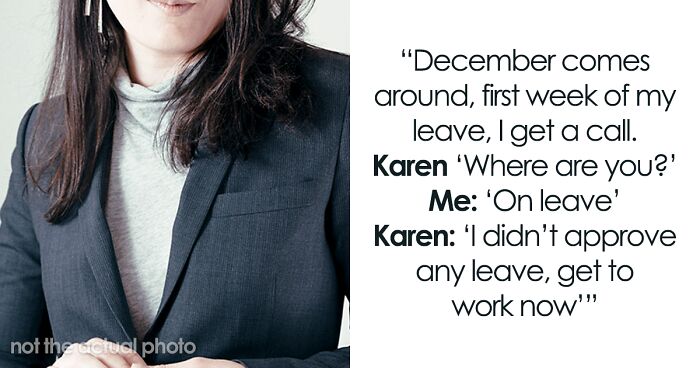
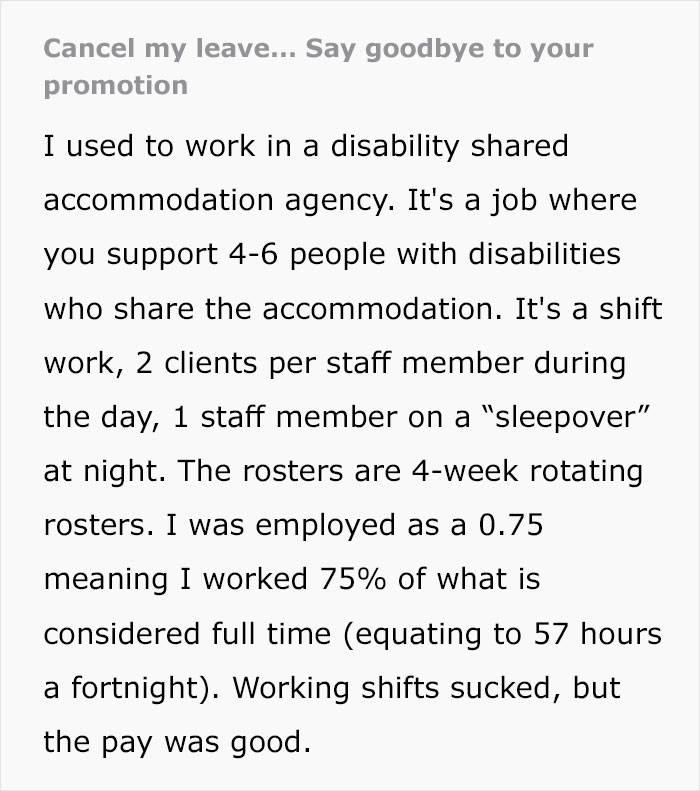
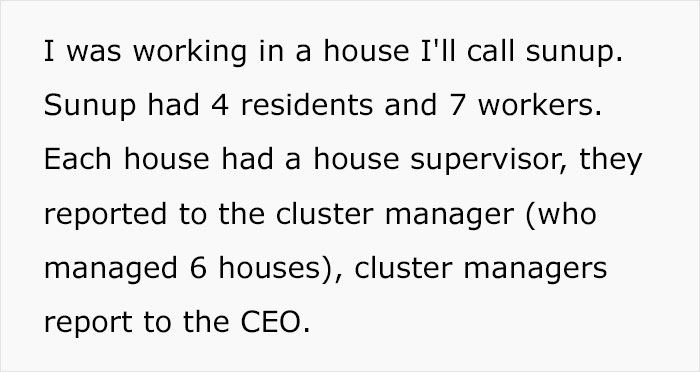

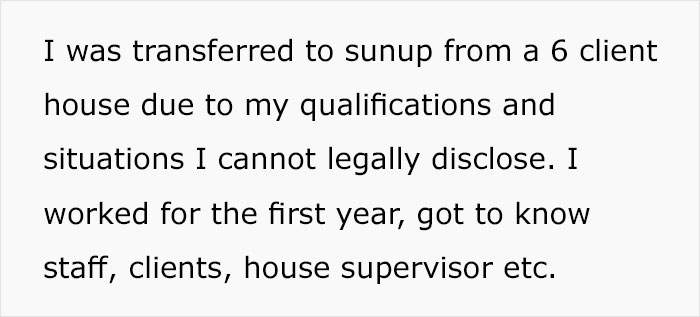
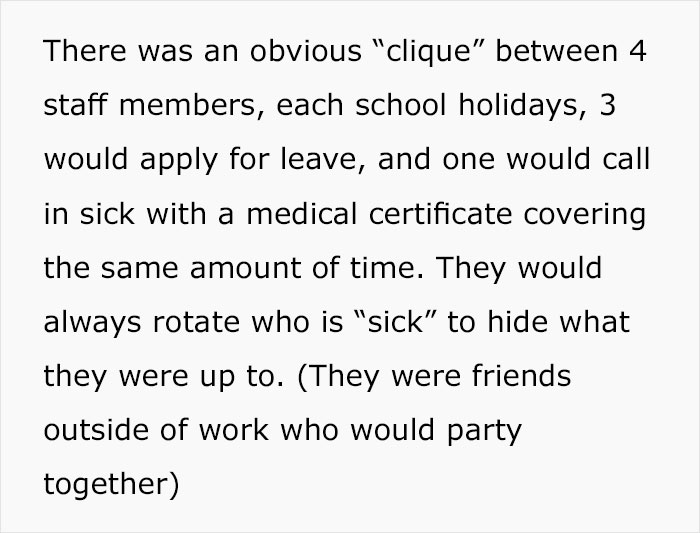
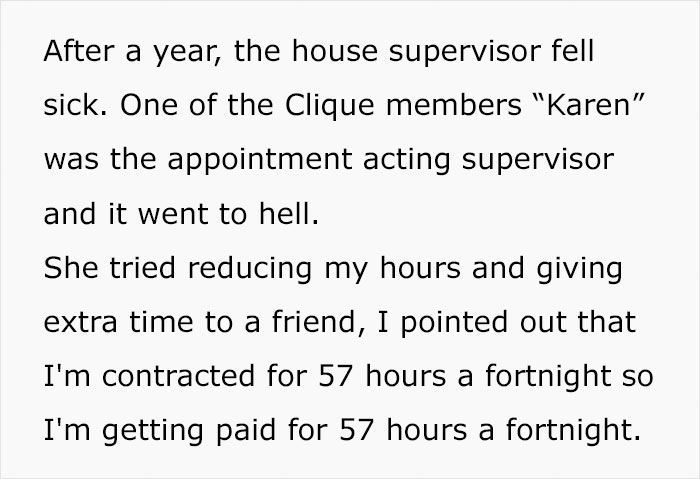
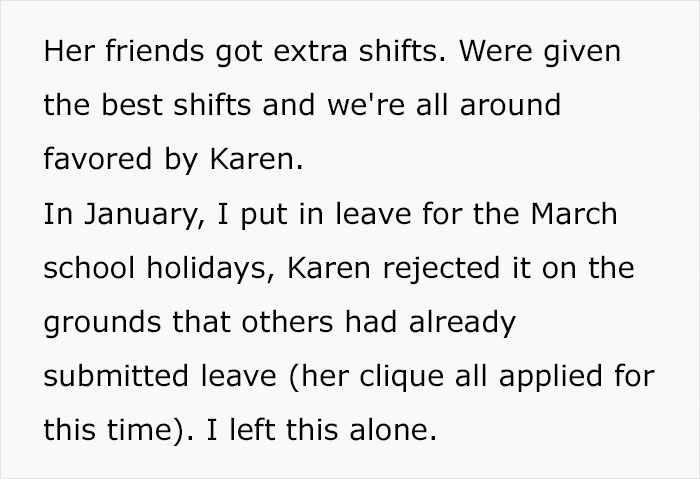
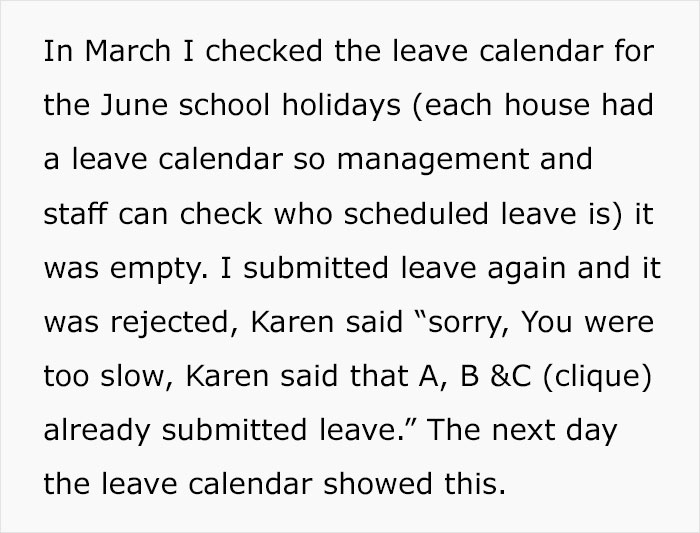
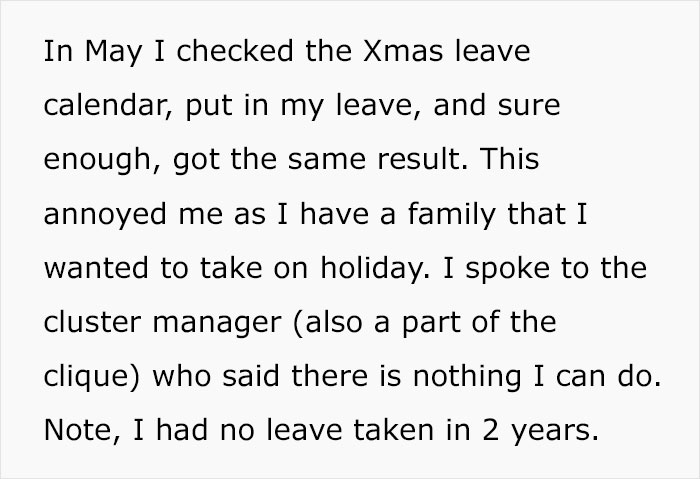
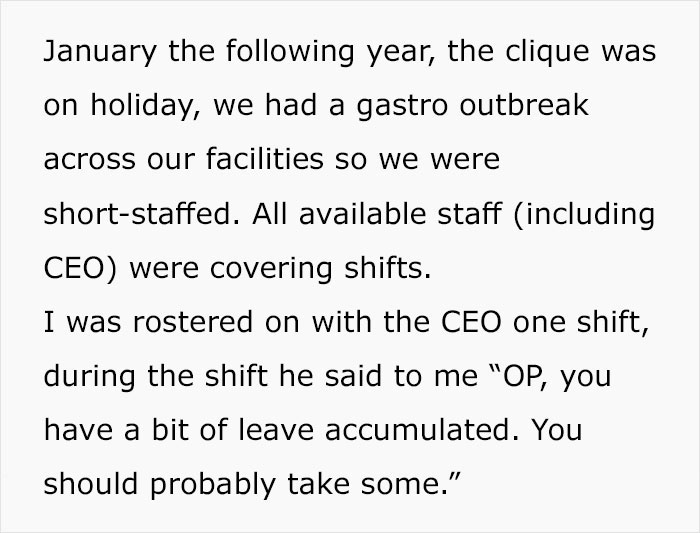
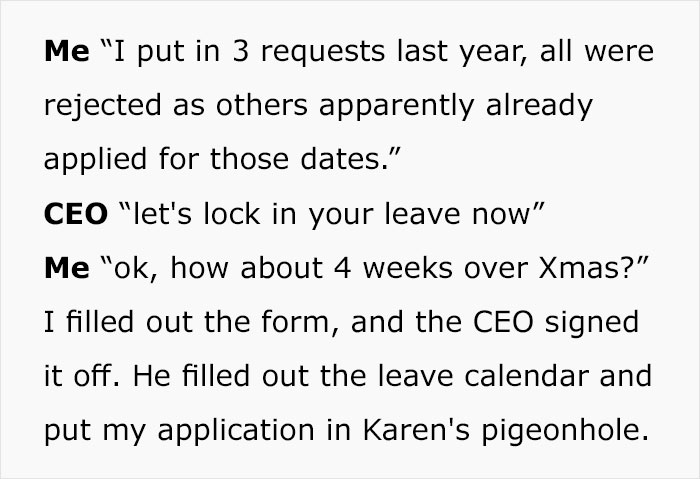

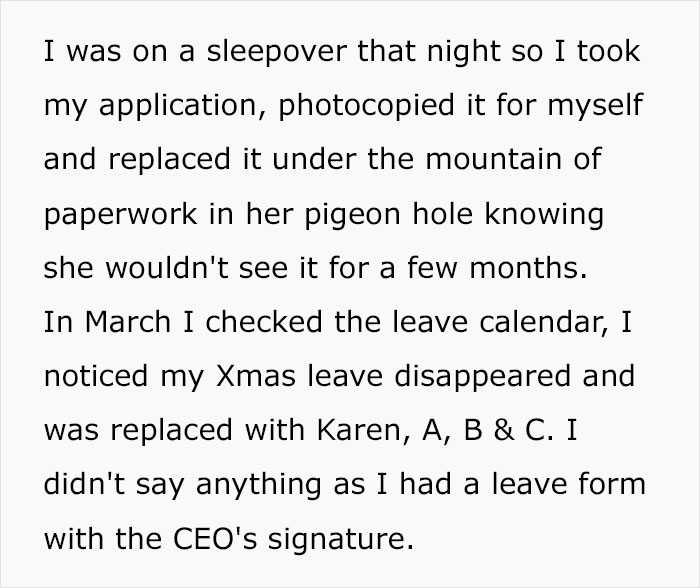
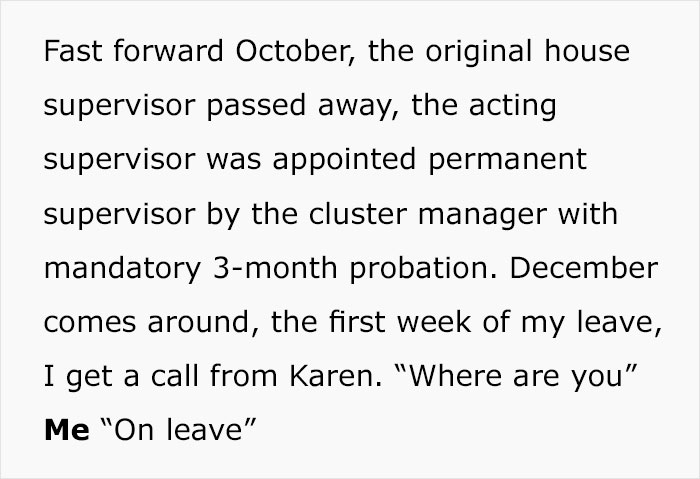
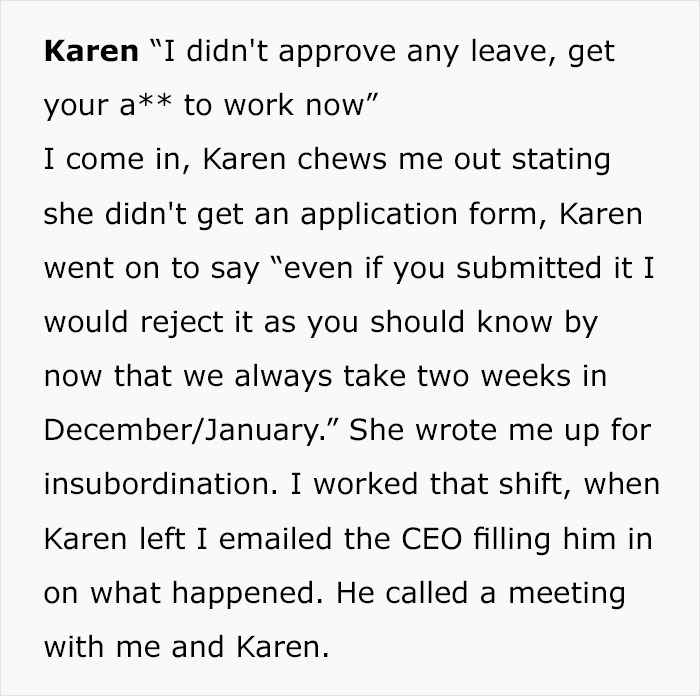
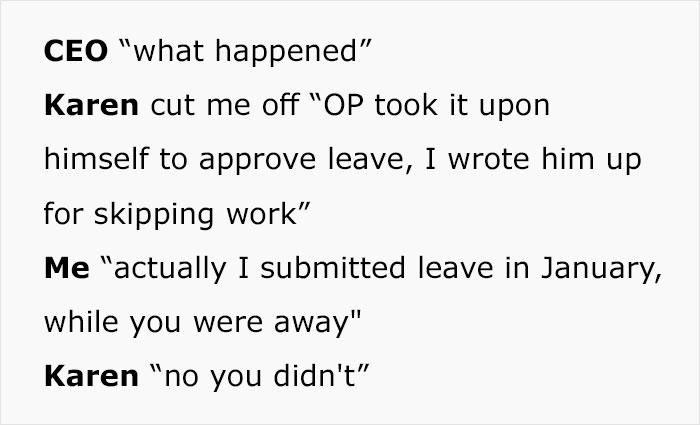
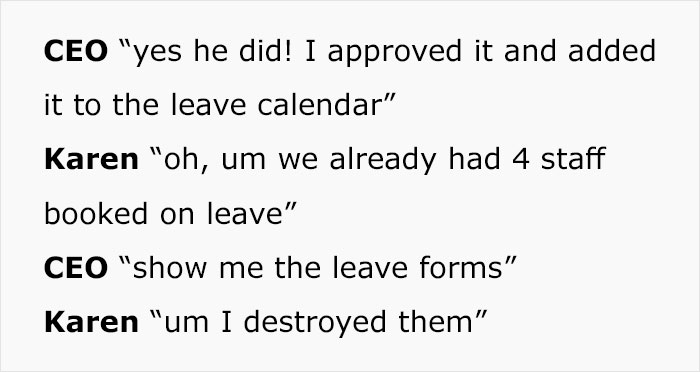

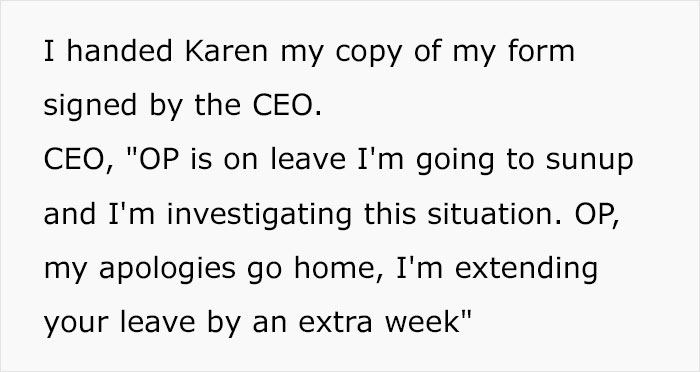
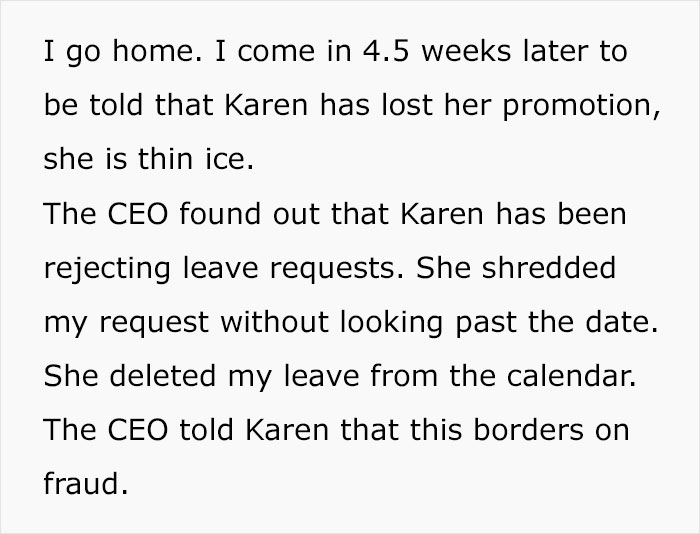
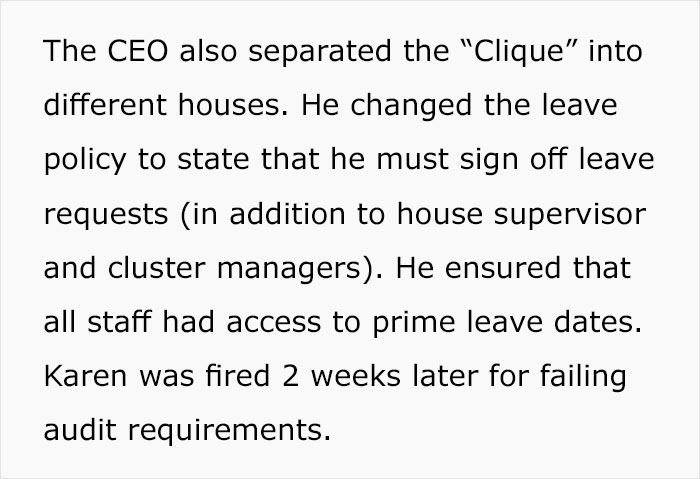
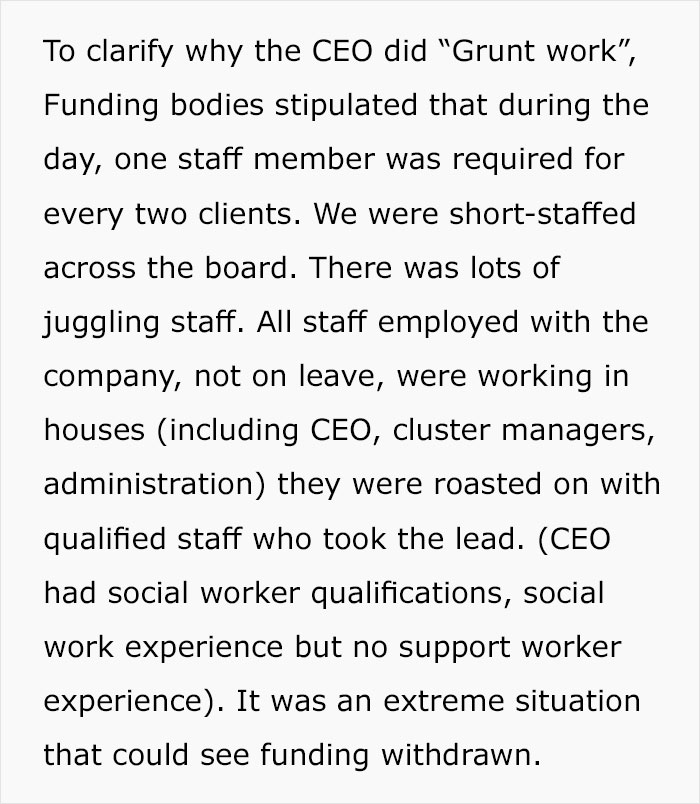



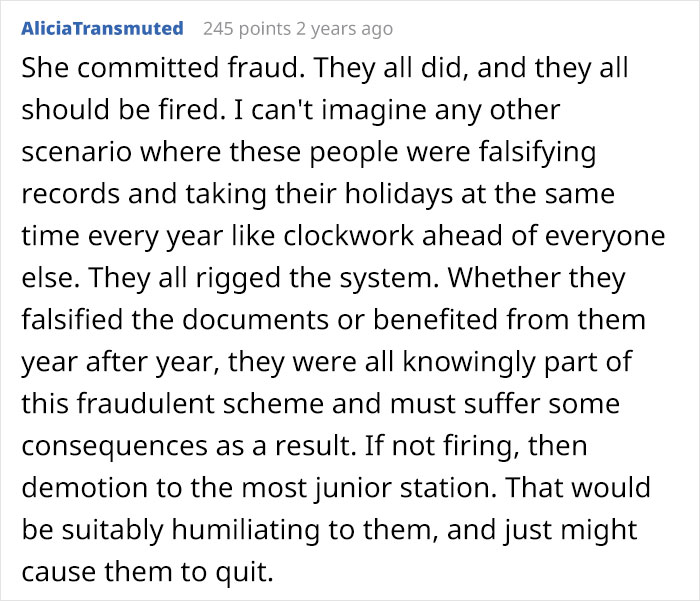







207
36